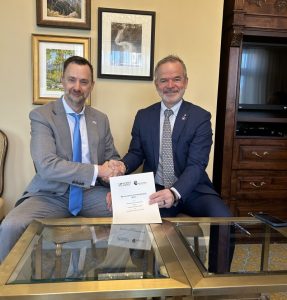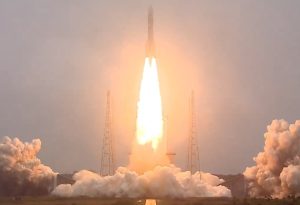Space Security Conference: Negotiating European Space Sovereignty in the New World Order
10th Mar 2025
At this year’s Space Security Conference at The Royal Institute of International Affairs, otherwise known as Chatham House, the watchwords were around navigating the uncertainty about an upended economic and political order.
Throughout panels, a consensus emerged around the awareness of a less secure world in need of intervention capable of being leveraged in the space domain.
“Anyone who has studied the West’s overall success in modern warfare will have recognised the decisive advantage enabled in space,” explained Chief Master Sergeant Ron Lerch, deputy chief of space operations for intelligence at the US Space Force. “Peer nations want to mirror that advantage with their own space capabilities.”
Patterns in acquisitions and contracts by global governments for satellite Earth observation and secure systems seem to suggest an increasing recognition around the supremacy of space domain awareness, which is accelerating the necessity for states to assure their sovereign access to space.
Space Security Conference and attendees’ views
Katya Bego, a senior research fellow at the institute, spoke exclusively to Orbital Today about the trend.
“In Europe and the UK we’re going to see this big push into sovereignty to enable alternative capabilities instead of being beholden to American – or indeed Chinese government and corporate systems. Across the board we’re going to see a big push to de-risk.”
Bego drew attention to IRIS² (Infrastructure for Resilience, Interconnectivity and Security by Satellite), a planned multi-orbit satellite internet constellation by the European Union as such an example of a homegrown European alternative, comparable to the US SpaceX Starshield project.
The constellation was announced in 2022 at a cost of €10.5 billion with the intention of deployment by 2027 with government service commencement expected in 2030.
The road forward
“If I were Europe, I would diversify and de-risk where I can,” Bego added. “I would transition to other European providers or other friendly peer nations – even, perhaps controversially – if those options are subpar. This doesn’t necessarily mean full divestment from Starlink, but definitely the establishment of fallback options, even if they’re inferior.”
Elizabeth Seward, head of space strategy and market development at BAE Systems agreed that changing politics meant Europe had an opportunity to navigate new waters.
“This is an opportunity to affirm old alliances and explore new ones,” she told Orbital Today at Space Security Conference. “BAE Systems is very involved in the GCAP (Global Combat Air Programme) program assisting with developing a next-generation fighter with Japan and Italy.”
In a personal capacity, outside of her position at BAE, she added; “The importance of accessing launch is changing. The change that SpaceX have delivered to the space industry as a whole is enormous – it’s the reason we’re seeing a prosperous space sector at the scale we do – but it’s established all that control into one company in one country. There’s a lot of space for competition there, and we need that.”
An opportunity for BRICS?
This shifting landscape did not mean a European re-legitimisation of Russia, as the boycotts of the country lose momentum, Bego added.
“I don’t see Europe welcoming Roscosmos back into the fold. It’s very unclear where the US is going to go with this sanction relief, and I do think Russians see opportunities in this moment, but it’s a little too early to say how Russian and American collusion will affect the space industry,” she says.
If the foundations of global allegiance change, they were more likely to be in China’s favour than Russia’s, she suggested.
As a giant in space science and the world’s second largest economy, a Chinese private space industry, once a laughable contingency, could grow rapidly in legitimacy to rival its peers. States with enduring anti-American sentiment would be particularly eager to explore some Chinese equivalent of the Artemis Accords.
“In the longer term, I would direct a lot more strategic investment within Europe both from government and industry for core technological platforms to build traction around them,” Bego said. “It can’t be an inward-facing exercise. Europe can provide alternatives to the American norm, especially if we work with the kinds of partners interested in providing trustworthy systems – the kind with no killswitch at the ready to cut service at a whim.”
In September 2024, SpaceX founder Elon Musk denied Starlink services to Ukrainian forces planning an attack of Crimea, a formerly Ukrainian territory annexed by Russia in 2014, long considered by Russophiles to be Russian land.
More recently Musk denied reports by Reuters that US negotiators had been threatening to cut off Ukrainian access to Starlink as part of peace talks, accusing the news group of propaganda, tweeting an image of the word Reuters composed of hundreds of the word “lies”, to make his point.







Thank you for your comment! It will be visible on the site after moderation.